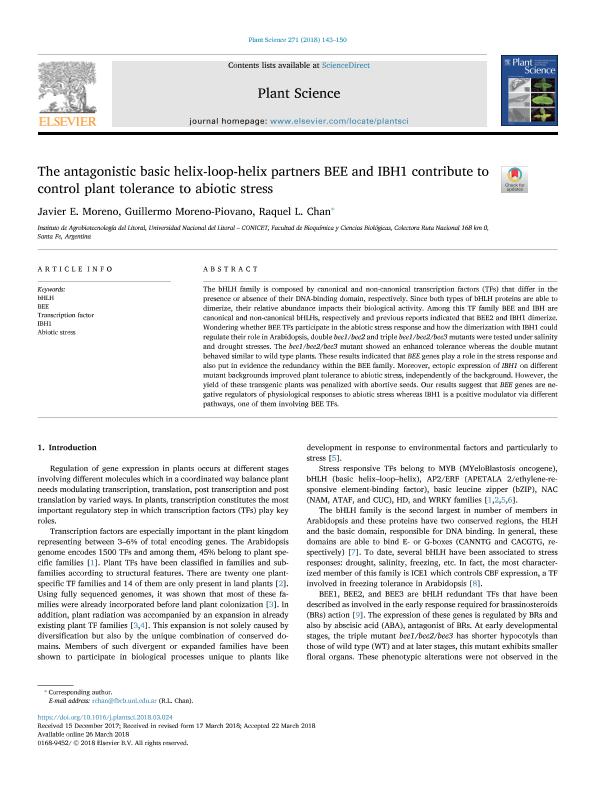Artículo
The antagonistic basic helix-loop-helix partners BEE and IBH1 contribute to control plant tolerance to abiotic stress
Fecha de publicación:
06/2018
Editorial:
Elsevier Ireland
Revista:
Plant Science
ISSN:
0168-9452
Idioma:
Inglés
Tipo de recurso:
Artículo publicado
Clasificación temática:
Resumen
The bHLH family is composed by canonical and non-canonical transcription factors (TFs) that differ in the presence or absence of their DNA-binding domain, respectively. Since both types of bHLH proteins are able to dimerize, their relative abundance impacts their biological activity. Among this TF family BEE and IBH are canonical and non-canonical bHLHs, respectively and previous reports indicated that BEE2 and IBH1 dimerize. Wondering whether BEE TFs participate in the abiotic stress response and how the dimerization with IBH1 could regulate their role in Arabidopsis, double bee1/bee2 and triple bee1/bee2/bee3 mutants were tested under salinity and drought stresses. The bee1/bee2/bee3 mutant showed an enhanced tolerance whereas the double mutant behaved similar to wild type plants. These results indicated that BEE genes play a role in the stress response and also put in evidence the redundancy within the BEE family. Moreover, ectopic expression of IBH1 on different mutant backgrounds improved plant tolerance to abiotic stress, independently of the background. However, the yield of these transgenic plants was penalized with abortive seeds. Our results suggest that BEE genes are negative regulators of physiological responses to abiotic stress whereas IBH1 is a positive modulator via different pathways, one of them involving BEE TFs.
Palabras clave:
BHLH
,
Transcription factor
,
IBH
,
Abiotic stress
Archivos asociados
Licencia
Identificadores
Colecciones
Articulos(IAL)
Articulos de INSTITUTO DE AGROBIOTECNOLOGIA DEL LITORAL
Articulos de INSTITUTO DE AGROBIOTECNOLOGIA DEL LITORAL
Citación
Moreno, Javier Edgardo; Moreno Piovano, Guillermo Samuel; Chan, Raquel Lia; The antagonistic basic helix-loop-helix partners BEE and IBH1 contribute to control plant tolerance to abiotic stress; Elsevier Ireland; Plant Science; 271; 6-2018; 143-150
Compartir
Altmétricas




